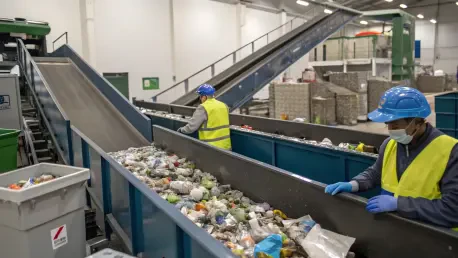The advancement of the Internet of Things (IoT) is revolutionizing the urban waste management landscape by enhancing efficiency and financial savings through cutting-edge technology. Innovation4Waste, a newly established brand by Partitalia, stands at the forefront of this technological transformation. Its groundbreaking initiatives will be on display from May 5 to 8 at Waste Expo 2025 in Las Vegas, the leading trade show in North America focusing on solid waste, recycling, and sustainability. As the global waste crisis looms with predictions of escalating waste production, the need for sophisticated and sustainable waste management solutions becomes even more critical. IoT technology, with its promise of elevating operational efficacy and data precision, emerges as a beacon of hope in addressing these challenges.
Enhancing Efficiency with IoT Solutions
Real-time Tracking and Optimized Logistics
At the core of IoT’s impact on waste management is the ability to drastically improve logistical operations through real-time tracking solutions. Innovation4Waste’s Asset Track-ID is a prime example, allowing comprehensive tracking of roll-off containers and significantly reducing the problem of misplaced containers. This advanced level of logistical insight not only ensures container availability where they are most needed but also helps in promptly addressing anomalies. The efficiency gained by real-time tracking results in a substantial reduction in operational costs and resource wastage, fostering quicker turnarounds and better asset utilization.
Furthermore, precision in logistics brought about by IoT solutions extends beyond mere tracking, as it provides actionable insights that inform strategic decisions and planning. The use of IoT devices, such as sensors and trackers, allows waste management firms to forecast trends in waste generation and tailor their collection and processing operations accordingly. Moreover, the strategic use of IoT-driven data helps in pinpointing inefficiencies, optimizing routes, and reducing unnecessary mileage, thereby contributing not only to operational savings but also lessening environmental impacts.
RFID Technology and Data Management
Apart from container tracking, IoT’s influence manifests in RFID (Radio-Frequency Identification) data collection systems that assure traceability and enhance data reliability in curbside waste collection. Innovation4Waste exemplifies these solutions with vehicle-mounted RFID readers, which possess high durability and power, and the Discovery Mobile, an ergonomic and wearable RFID reader. Combined, these innovations streamline waste data collection, ensuring accuracy and efficiency in its management and dissemination.
The utilization of RFID technology heralds a new era where real-time data is accessible to waste management services at any given moment. This facilitates more informed decision-making processes, supports compliance with regulatory standards, and enhances transparency. The data garnered through RFID systems is not only integral for planning and efficiency but also serves as a fundamental input for developing sustainable waste management strategies. Such advanced incorporated technology fosters a culture of accountability and innovation within the industry, a necessary catalyst for transitioning to more sustainable urban waste solutions.
A Path Towards Sustainable Waste Management
Strategic Resource Management
As cities grapple with increasing volumes of waste, strategic resource management becomes a cornerstone of effective urban waste solutions. Innovation4Waste champions the integration of IoT to support better resource allocation in waste management practices. By leveraging IoT data, these solutions facilitate precise planning, enabling waste management companies to deploy resources more effectively where they are most needed. This strategic alignment not only improves operational efficiency but also generates environmental benefits by minimizing the carbon footprint associated with waste collection and processing.
The wider adoption of these practices empowers municipalities and waste management firms to adeptly handle future challenges related to waste management. The key takeaway lies in harnessing IoT’s potential as a transformative tool that aligns human creativity with machine intelligence, creating responsive systems capable of adapting to evolving demands and expectations. Achieving excellence in resource management through IoT integration serves as a proactive approach to addressing waste-related issues.
Future of Waste Management
The essence of IoT’s influence on waste management is largely seen in its capacity to enhance logistical operations via real-time tracking tools. Innovation4Waste’s Asset Track-ID exemplifies this by enabling detailed monitoring of roll-off containers, thereby solving the issue of misplaced containers. This heightened logistical insight ensures container availability where required and promptly addresses issues, improving asset utilization and turnaround times. The real-time tracking efficiency leads to significant reductions in operational costs and resource waste.
Additionally, IoT advancements extend beyond tracking to provide valuable insights for strategic planning and decision-making. IoT devices, including sensors and trackers, enable waste management companies to predict waste generation trends and adapt their collection and processing strategies. Moreover, IoT-driven data identifies inefficiencies, optimizes routes, and reduces unnecessary travel, contributing to operational cost savings and minimizing environmental impacts. Thus, waste management benefits from both financial savings and ecological improvements through precise logistics.









